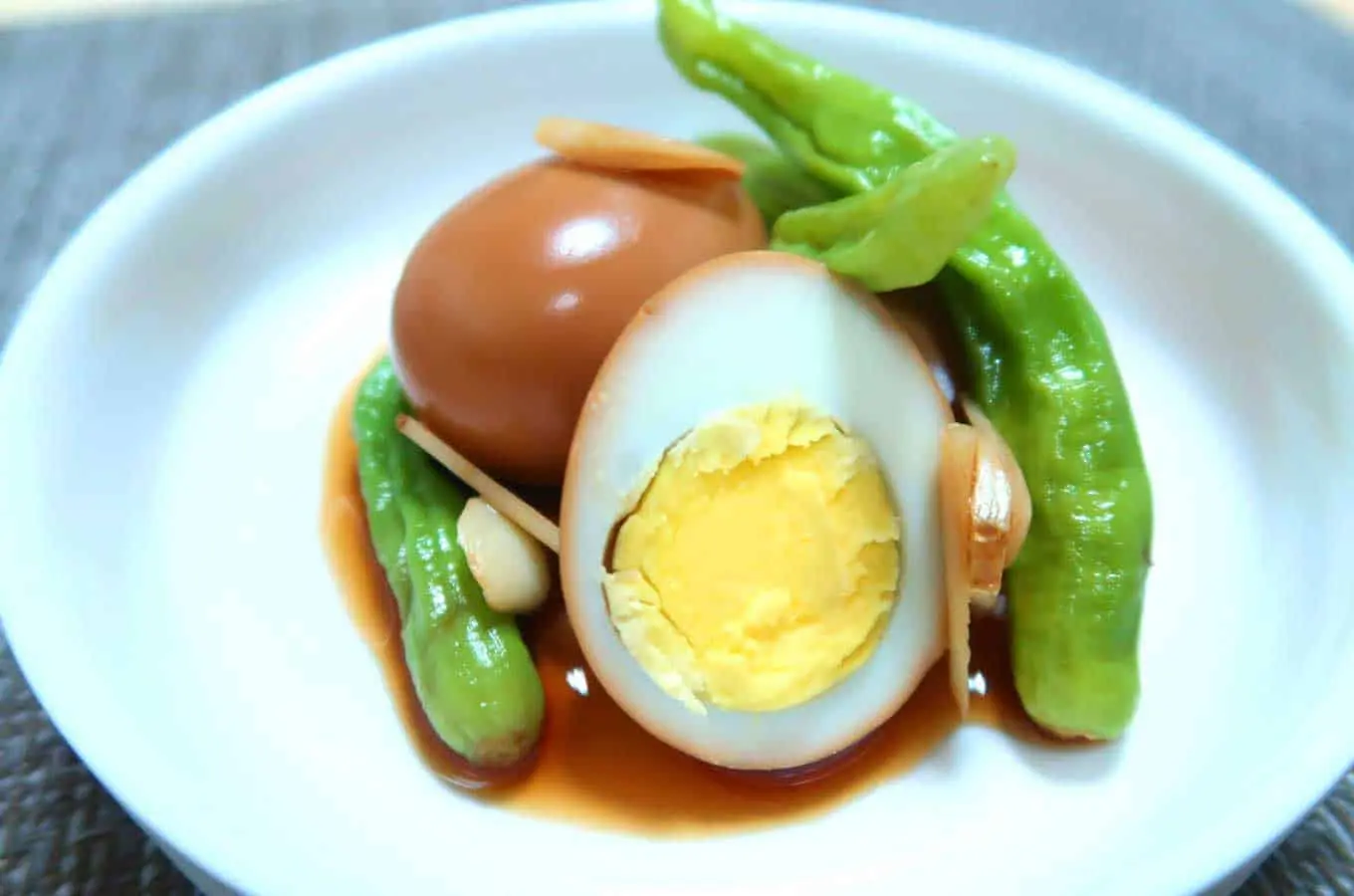Soy Sauce Eggs: Delicious and Versatile Asian Delicacy
Soy sauce eggs, known as shoyu tamago in Japanese or lu dan in Chinese, are a popular delicacy across many Asian cuisines. These flavorful, umami-packed eggs are not only delicious but also incredibly versatile, making them a perfect addition to various dishes or a standalone snack. In this comprehensive guide, we’ll explore everything you need to know about soy sauce eggs, from their history and cultural significance to preparation methods and serving suggestions.
What Are Soy Sauce Eggs?
Soy sauce eggs are hard-boiled eggs that have been marinated in a mixture primarily composed of soy sauce. The eggs absorb the flavors of the marinade, resulting in a savory, salty taste and a beautiful brown exterior. The marination process not only imparts flavor but also gives the eggs a unique texture, with the egg whites becoming slightly firmer and the yolks taking on a creamy consistency.
Key Ingredients in Soy Sauce Eggs
While recipes may vary, the basic components of soy sauce eggs typically include:
- Hard-boiled eggs
- Soy sauce
- Water
- Sugar
- Optional aromatics (such as garlic, ginger, or star anise)
The History and Cultural Significance of Soy Sauce Eggs
Soy sauce eggs have a rich history in Asian cuisine, particularly in Chinese and Japanese culinary traditions. These marinated eggs have been enjoyed for centuries and hold cultural significance in various contexts.
Origins in Chinese Cuisine
In Chinese cuisine, soy sauce eggs, or lu dan, are believed to have originated during the Ming Dynasty (1368-1644). They were initially created as a way to preserve eggs and add flavor. Over time, they became a popular street food and a common addition to various dishes.
Japanese Adaptation: Ajitsuke Tamago
In Japan, a similar concept evolved into ajitsuke tamago, or seasoned eggs, which are a crucial component of ramen dishes. These eggs are often marinated for a shorter time and may have a softer yolk compared to their Chinese counterparts.
Health Benefits of Soy Sauce Eggs
Soy sauce eggs not only taste great but also offer several nutritional benefits:
- High-quality protein: Eggs are an excellent source of complete protein, containing all essential amino acids.
- Vitamins and minerals: Eggs provide vitamins A, D, E, and B-complex, as well as minerals like iron and zinc.
- Antioxidants: Soy sauce contains antioxidants that may help protect cells from damage.
- Low in calories: A single soy sauce egg is relatively low in calories, making it a satisfying yet diet-friendly snack.
However, it’s important to note that soy sauce is high in sodium, so those watching their salt intake should consume soy sauce eggs in moderation.
How to Make Soy Sauce Eggs
Creating delicious soy sauce eggs at home is a straightforward process. Here’s a basic recipe to get you started:
Ingredients:
- 6 large eggs
- 1/2 cup soy sauce
- 1/4 cup water
- 2 tablespoons sugar
- 1 clove garlic, crushed (optional)
- 1 slice of ginger (optional)
- 1 star anise (optional)
Instructions:
- Hard-boil the eggs and peel them carefully.
- In a saucepan, combine soy sauce, water, sugar, and optional aromatics.
- Heat the mixture until the sugar dissolves, then let it cool to room temperature.
- Place the peeled eggs in a container and pour the cooled marinade over them.
- Ensure the eggs are fully submerged, using a weight if necessary.
- Refrigerate for at least 4 hours, or preferably overnight.
- Remove the eggs from the marinade and slice before serving.
Classic Soy Sauce Eggs Recipe
Ingredients:
- 6 large eggs
- 1/2 cup soy sauce
- 1/4 cup water
- 2 tablespoons sugar
- 1 clove garlic, crushed (optional)
- 1 slice of ginger (optional)
- 1 star anise (optional)
Instructions:
- Hard-boil the eggs:
- Place eggs in a pot and cover with cold water.
- Bring to a boil, then reduce heat and simmer for 7 minutes.
- Immediately transfer eggs to an ice bath to stop cooking.
- Prepare the marinade:
- In a saucepan, combine soy sauce, water, sugar, and optional aromatics.
- Heat the mixture over medium heat, stirring until sugar dissolves.
- Remove from heat and let cool to room temperature.
- Marinate the eggs:
- Carefully peel the cooled eggs.
- Place peeled eggs in a container or zip-top bag.
- Pour cooled marinade over the eggs, ensuring they’re fully submerged.
- If needed, use a small plate or weight to keep eggs submerged.
- Refrigerate and wait:
- Seal the container and refrigerate for at least 4 hours, preferably overnight.
- For stronger flavor, marinate up to 24 hours.
- Serve:
- Remove eggs from marinade and pat dry.
- Slice in half or quarters and serve as desired.
Enjoy your homemade soy sauce eggs!
Tips for Perfect Soy Sauce Eggs
To elevate your soy sauce eggs game, consider these helpful tips:
- Use room temperature eggs for more even cooking.
- Don’t overcook the eggs; slightly undercooked is better as they’ll continue to cook in the hot marinade.
- Crack the eggshells slightly before marinating for a marbled effect.
- Experiment with different types of soy sauce (light, dark, or a combination) for varied flavors.
- Add a splash of rice vinegar or mirin to the marinade for extra depth.
- Try different aromatics like cinnamon sticks, bay leaves, or peppercorns.
Variations of Soy Sauce Eggs
While the classic recipe is delicious, there are many variations to explore:
1. Tea Eggs (Cha Ye Dan)
A popular Chinese variation where eggs are cracked and simmered in a mixture of tea, soy sauce, and spices, creating a beautiful marbled pattern.
2. Ramen Eggs (Ajitsuke Tamago)
These Japanese-style eggs are marinated for a shorter time and often have a soft, jammy yolk, perfect for topping a bowl of ramen.
3. Soy Sauce Quail Eggs
A bite-sized version using quail eggs, popular as an appetizer or bar snack.
4. Spicy Soy Sauce Eggs
Add chili flakes, Sichuan peppercorns, or hot sauce to the marinade for a spicy kick.
Serving Suggestions for Soy Sauce Eggs
Soy sauce eggs are incredibly versatile and can be enjoyed in numerous ways:
- As a topping for ramen, udon, or other noodle soups
- Sliced and added to salads for a protein boost
- As part of a bento box or packed lunch
- Chopped and used in sandwich fillings
- Served as an appetizer or snack with cold beer
- Added to fried rice or stir-fries
- As a component in a traditional Chinese breakfast
Storing Soy Sauce Eggs
To ensure your soy sauce eggs stay fresh and delicious:
- Store marinated eggs in an airtight container in the refrigerator.
- Consume within 3-4 days for best quality and safety.
- Do not freeze soy sauce eggs, as this can affect their texture.
Soy Sauce Eggs in Popular Culture
Soy sauce eggs have made appearances in various forms of media, highlighting their cultural significance:
- In the animated film “Spirited Away” by Studio Ghibli, soy sauce eggs are featured as a comforting food.
- Many food bloggers and YouTubers have created content centered around perfecting soy sauce eggs recipes.
- The rise of social media has led to soy sauce eggs becoming a popular subject for food photography, with their rich colors and textures making for visually appealing images.
Nutritional Information for Soy Sauce Eggs
While exact values may vary depending on the recipe and marination time, here’s a general nutritional breakdown for one soy sauce egg:
- Calories: Approximately 70-80 kcal
- Protein: 6-7 grams
- Fat: 5-6 grams
- Carbohydrates: 1-2 grams
- Sodium: 300-400 mg (varies greatly depending on marination time)
It’s important to note that the sodium content can be high due to the soy sauce, so those on sodium-restricted diets should consume soy sauce eggs in moderation.
Conclusion
Soy sauce eggs are a timeless favorite in Asian cuisine, valued for their rich flavor, versatility, and simple preparation. Once used as a preservation method, they are now a beloved dish worldwide. Whether you’re revisiting or trying them for the first time, experimenting with different recipes can help you find your ideal version. Give soy sauce eggs a try and enjoy their savory, umami-packed taste.







